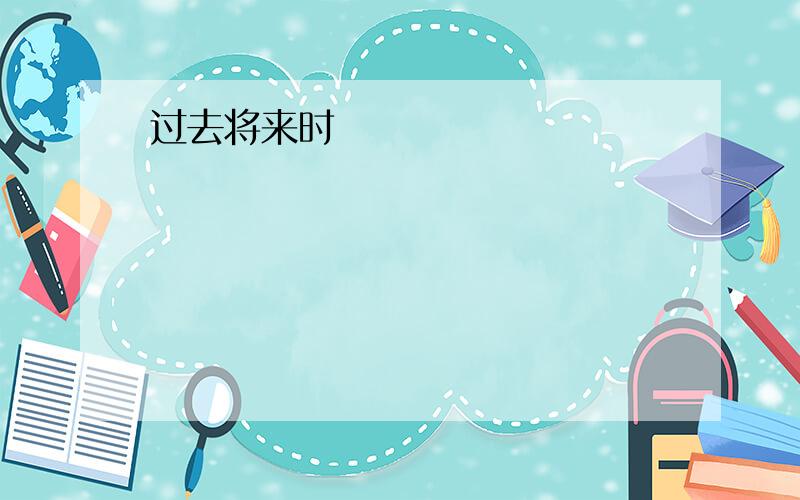过去将来时
来源:学生作业帮助网 编辑:作业帮 时间:2024/04/24 17:00:38

过去将来时
过去将来时
过去将来时
过去将来时:
1.概念:立足于过去某一时刻,从过去看将来,常用于宾语从句中.
2.时间状语:the next day(morning,year…),the following month(week…),etc.
3.基本结构:was/were/going to + do;would/should + do.
4.否定形式:was/were/not + going to + do;would/should + not + do.
5.一般疑问句:was或were放于句首;would/should 提到句首.
6.例句:He said he would go to Beijing the next day.
I asked who was going there .
一.定义:一般过去将来时表示从过去的某一时间来看将来要发生的动作或存在的状态。过去将来时常用于宾语 句和间接引语中。 一般过去将来时的出发点是过去,即从过去某一时刻看以后要发生的动作或状态。 二.构成(例句如下:) 肯定句:主语+be(was,were)going to+动词原形+其它 或:主语+would(should would)+动词原形+其它 否定句:主语+be(was,were)not going to+动词原形+其它 或:主语+would(should或could)not+动词原形 +其它 疑问句:Be(Was,Were)+主语+going to+动词原形+其它 或:Would(Should could)+主语+动词原形+其它 三结构1.同一般将来时不一样,把系动词be变为过去式,把will,shall变为过去式。 例句:I didn't know if he would come. =I didn't know if he was going to come. 我不知道他是否会来。 She was sixty-six. In three years,she would be sixty-nine. 她66岁了。三年后,她是69岁。 She told us that she would not go with us,if it rained. 她告诉我们,如果下雨,她就不和我们一起去了。 I didn't know how to do it. What would be their ideas? 我不知如何去做,他们会有什么想法呢? 2.过去将来时常可用来表示过去习惯性的动作。此时,不管什么人称,一律用would。 过去将来时有时可带时间状语 注意 1"was/were going to + 动词原形"或"was/were +动词不定式完成式"可表示未能实现的过去将来时间的动作。 2was/were about to do "was/were about to do"表示说话的瞬间就会发生的动作。 3was/were on the point of doing 提示"be about to do" 和 "be on the point of doing"结构一般不与表示将来的时间状语连用,但后面可以接when引导的分句。 四、标志词 一、"would+动词原形"表示过去将来时 "would+动词原形"构成过去将来时,常表示根据计划或安排即将发生的事。 例1:He said he would come to see me.他说他要来看我。 例2:He told me he would go to Beijing.他告诉我他将去北京。 二、"was /were+going to+动词原形"表示过去将来时 "was /were+going to+动词原形"也可表示根据计划或安排即将发生的事。 例1:She said she was going to start at once.她说她将立即出发。 例2:I was told that he was going to return home.他告诉我他准备要回家。 "was /were+going to+动词原形"还可表示根据当时情况判断有可能但不一定会发生某事。 例:It seemed as if it was going to rain.看来好像要下雨。 三、某些动词的过去进行时可表示过去将来时 come,go,leave,arrive,start等严格按照时间表发生的表起止的动词可用过去进行时代替过去将来时。 例1:He said the train was leaving at six the next morning.他说火车第二天早晨出发。 例2:She told me she was coming to see me.她告诉我她要来看我。 四、特定场合的一般过去时可表示过去将来时 条件状语从句和时间状语从句中须用一般过去时代替过去将来时。 例1:I didn't know when she would come, but when she came I would let you know.我不知道她什么时候来,但她来了我会告诉你。 析:第一个when引导宾语从句,可使用将来时,第二个when引导时间状语从句,只能用一般过去时代替过去将来时。 例2:I didn't know if she would come,but if she came I would let you know.我不知道她是否来,但如果她来我会告诉你。 析:第一个if引导宾语从句,可使用将来时,第二个if引导条件状语从句,只能用一般过去时代替过去将来时。